In industrial and automotive applications, maintaining efficient lubrication and preventing contaminants from entering critical components are essential to equipment longevity. Skeleton oil seals—also known as metal-cased or backbone oil seals—combine a robust internal frame with an elastomeric sealing lip, delivering outstanding durability and performance. For businesses seeking consistent quality at competitive prices, bulk purchasing of rubber skeleton oil seals represents a strategic investment. This article explores the advantages, material considerations, and purchasing tips to help you secure the right seals for your operations.
1. Understanding Skeleton Oil Seals
Skeleton oil seals feature an internal steel or stainless‑steel frame that provides structural support, complemented by a flexible rubber sealing lip that maintains tight contact with rotating shafts. This hybrid design minimizes deformation under pressure and reduces leakage, even at high speeds. The metal skeleton ensures precise installation and resists distortion, while the rubber lip compensates for shaft misalignment and surface irregularities.
2. Key Materials and Their Properties
When selecting rubber skeleton oil seals, material choice directly impacts performance:
Nitrile Butadiene Rubber (NBR): Offers excellent resistance to petroleum‑based oils and greases. It performs well in temperatures from –40°C to +125°C and is a cost‑effective option for general applications.
Fluorocarbon Rubber (FKM/Viton): Excels in high‑temperature environments up to +250°C and provides superior chemical resistance. Ideal for engines, compressors, and aggressive fluids.
Silicone Rubber (VMQ): Delivers flexibility across a wide temperature range (–60°C to +2325°C) and superb weathering resistance, making it suitable for outdoor machinery.
Polyurethane (PU): Known for high tear and abrasion resistance, PU seals withstand heavy loads and intense friction, although their oil resistance is moderate.
3. Advantages of Bulk Purchasing
Cost Savings: Volume discounts lower unit costs, reducing overall procurement expenses.
Inventory Assurance: Maintaining an on‑hand stock of common sizes prevents downtime caused by unexpected seal failures.
Consistency: Ordering in bulk from a reputable supplier ensures uniform quality across all seals, minimizing variations that could compromise performance.
Customization Opportunities: Large orders often allow for tailored design options—such as specific frame thicknesses or lip geometries—to match proprietary equipment.
4. Selection and Supplier Criteria
To maximize return on investment, follow these guidelines:
Accurate Sizing: Verify inner diameter, outer diameter, and width against shaft and housing dimensions. Even minor discrepancies can lead to leaks or premature wear.
Performance Specifications: Ensure seals meet required pressure, speed, and temperature ratings. Request datasheets and test reports when needed.
Quality Standards: Choose suppliers certified to ISO 9001 or IATF 16949, which demonstrate rigorous quality control systems.
After‑Sales Support: Opt for manufacturers offering technical assistance, installation guidelines, and warranty coverage.

Oil seals, sealants, rubber seals manufacturers, our website: www.dedeseal.com